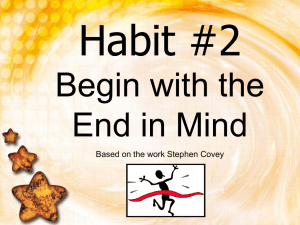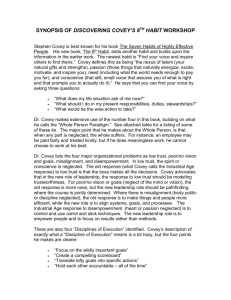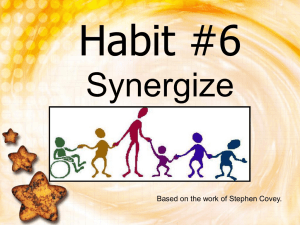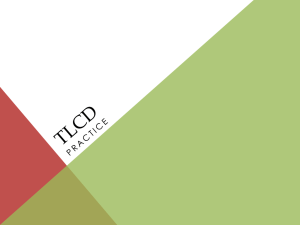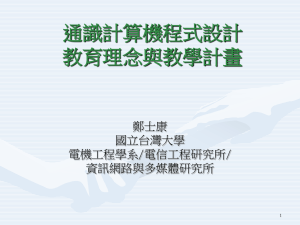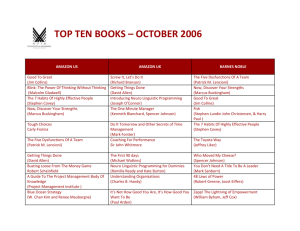Ombuds Outlook — November 2013 - Ombuds/Dispute Resolution
advertisement
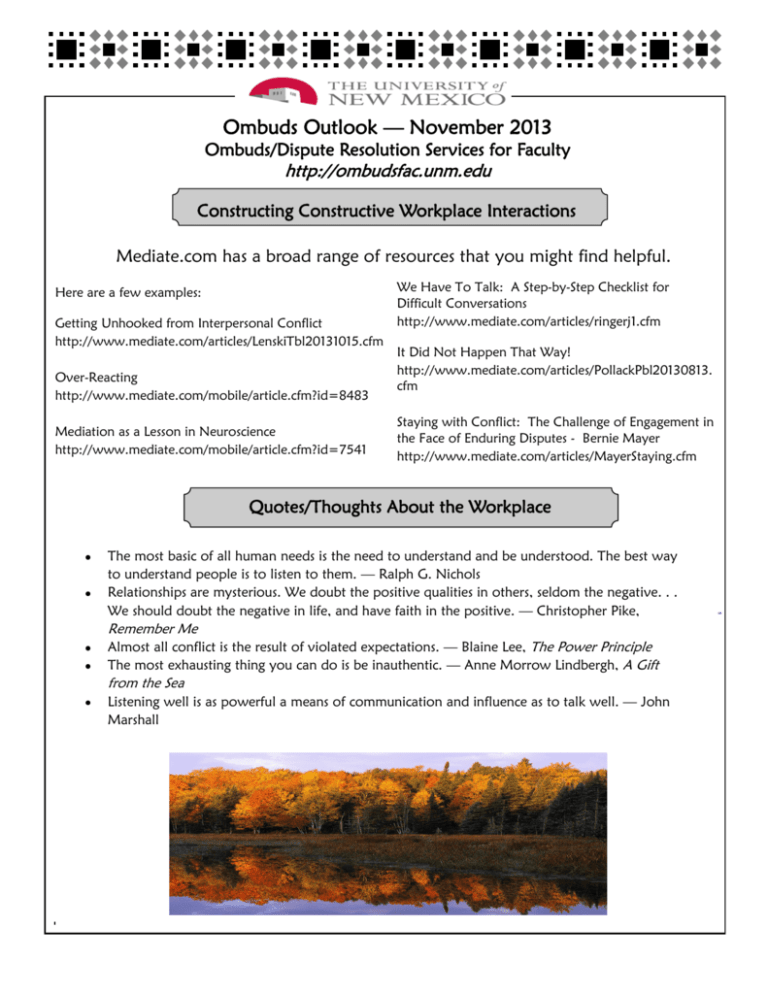
Ombuds Outlook — November 2013 Ombuds/Dispute Resolution Services for Faculty http://ombudsfac.unm.edu Constructing Constructive Workplace Interactions Mediate.com has a broad range of resources that you might find helpful. Here are a few examples: Getting Unhooked from Interpersonal Conflict http://www.mediate.com/articles/LenskiTbl20131015.cfm Over-Reacting http://www.mediate.com/mobile/article.cfm?id=8483 Mediation as a Lesson in Neuroscience http://www.mediate.com/mobile/article.cfm?id=7541 We Have To Talk: A Step-by-Step Checklist for Difficult Conversations http://www.mediate.com/articles/ringerj1.cfm It Did Not Happen That Way! http://www.mediate.com/articles/PollackPbl20130813. cfm Staying with Conflict: The Challenge of Engagement in the Face of Enduring Disputes - Bernie Mayer http://www.mediate.com/articles/MayerStaying.cfm Quotes/Thoughts About the Workplace The most basic of all human needs is the need to understand and be understood. The best way to understand people is to listen to them. — Ralph G. Nichols Relationships are mysterious. We doubt the positive qualities in others, seldom the negative. . . We should doubt the negative in life, and have faith in the positive. — Christopher Pike, Remember Me Almost all conflict is the result of violated expectations. — Blaine Lee, The Power Principle The most exhausting thing you can do is be inauthentic. — Anne Morrow Lindbergh, A Gift from the Sea Listening well is as powerful a means of communication and influence as to talk well. — John Marshall Ombuds/Dispute Resolution Services for Faculty Page 2 The Speed of Trust Covey, S.M.R. (2006). The Speed of Trust. Free Press, New York, NY. Trust is a commodity readily accepted in personal relationships, and is sometimes overlooked in the workplace. Stephen Covey (2006) examines the overlooked and underestimated power of trust in his book, The Speed of Trust. He informs readers on ways to inspire lasting trust in their personal and professional relationships, and outlines thirteen behaviors that can accelerate trust, which in turn, can accelerate performance in the work place. Five of these behaviors are: Create Transparency: Covey explains that this is about being open, real, genuine, and about telling the truth in a way people can verify. Transparency is built on the principles of honesty, openness, integrity, and authenticity. Sometimes it helps to consider the opposite of transparency — which is illusion. Illusion is “pretending” and “seeming” rather than “being.” It is making things appear different than they really are. Get Better: Covey says that getting better depends on the principles of continuous improvement, learning, and change. When others see you as a learning, growing, and renewing person — or your organization as exhibiting these qualities — they develop confidence in your ability to succeed in a changing environment. Clarify Expectations: Create upfront a shared vision and agreement about what is to be done. Covey warns that this is a behavior that people rarely pay attention to. Covey calls it the behavior of prevention because if you focus on this one early on, you will avoid headaches and heartaches later. Keep Commitments: Covey reports that keeping commitments is the number one influencing behavior in any discussion of trust. Covey says that this is the quickest way to build trust in any relationship — be it with an employee, a boss, a team member, a customer, a spouse, a child, or the public in general. Follow through on what you say will do. Extend Trust: This behavior is different in kind from the other behaviors because it is shifting from “trust” as a noun to “trust” as a verb. Covey explains while the other behaviors help you become a more trusted person or manager, extending trust, i.e., trusting, will help you become a more trusting leader. Not only does it build trust, it leverages trust. It creates reciprocity: when you trust people, other people tend to trust you in return. Extending trust is one of the best ways to create trust when it is not there. The remaining eight behaviors for building trust are: Talk Straight Deliver Results Demonstrate Respect Show Loyalty Confront Reality Practice Accountability Right Wrongs Listen First The Speed of Trust can be borrowed from the ODR Library. Please contact Jean Civikly-Powell at jcivikly@unm.edu. Summary prepared by Janene Pack, Graduate Assistant, Ombuds/Dispute Resolution Services for Faculty
